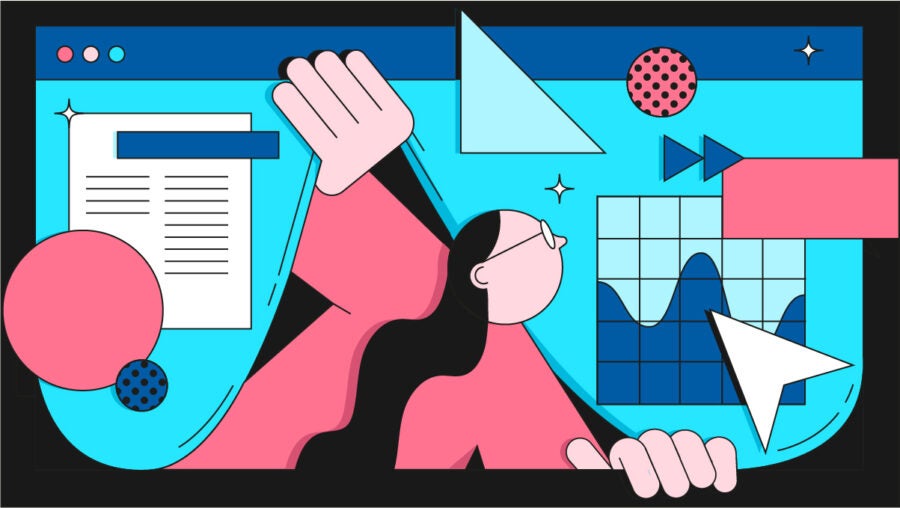
ASOS falls behind the trend
Shares in ASOS slumped 11% this week after the online fashion retailer posted an adjusted pre-tax loss of £87.4m, much worse than analysts expected, and forecast a fall in sales for the the rest of 2023. After a boom in demand during the Covid lockdowns, the business has struggled with supply chain issues and competition from even cheaper rivals such as Shein. However, its CEO José Antonio Ramos Calamonte, who is leading a restructure of the business, said he remained confident ASOS will return to “sustainable profit” by the end of the year.
Nevertheless, it’s a full from grace for one of the former darlings of the UK tech space. The shine has worn off the online fashion scene as shops have reopened, with the likes of Next and Marks & Spencer performing better than their pureplay rivals. High inflation and the associated cost-of-living crisis also make this a difficult time to turn around performance. Ramos has his work cut out.
Google backs the bots
Google is launching a new AI system called PaLM2 across 25 of its products. The language model is capable of automating tasks in coding, maths, translation and text generation, an executive at DeepMind, Google’s AI division, said. It will also be used to answer many search queries, raising fears it will decimate search traffic to existing publishers’ websites.
Despite the millions of dollars of investment the tech giant has pumped into AI over the past decade, it is still arguably playing catch up to OpenAI’s ChatGPT. Google’s own chatbot Bard has been labelled “worse than useless” by its own employees. However, the company is a leader in AI research – last year, its employees worked on more than a fifth of the top-cited academic papers published in the growing field – and the race to lead in this area has only just started.
Goldman Sachs pays out over discrimination
Goldman Sachs has agreed to pay $215m (£170m) to settle a class action lawsuit brought by former employees who say the bank systematically discriminates against its female staff. Claims include that female vice-presidents were paid 20% less than their male counterparts.
The class action lawsuit was initially brought in 2010 by former employees Cristina Chen-Oster, Lisa Parisi and Shanna Orlich but has since expanded to include 2,800 women. Female associates and vice-presidents who worked in the investment banking, investment management and securities divisions as far back as 2002 could be entitled to a payout.
But it is not just accusations of pay disparity that have dogged the bank. The lawsuit also includes claims of 75 incidents of sexual assault and harassment, including rape, involving senior bankers between 2000 and 2011.
The case was due to go to court next month and would have been a rare public platform to air incidents of gender discrimination at one of the world’s financial giants. Instead, although Goldman Sachs still denies the allegations, they’ve decided to pay up. Further still, they will be working with external experts to assess all performance evaluation and promotion processes to make sure they are fair and fit for the future.
Share buybacks surge
The world’s 1,200 largest publicly-traded businesses bought back $1.3tn (£1tn) of stock in 2022, making it a record-breaking year for share buybacks. The total was up 22% on the previous year, according to new research published by asset management group Janus Henderson, and almost matched the amount paid out in dividends.
The results of the study highlight the rapidly increasing value of global share buybacks, which have tripled over the past decade. Companies use buybacks to increase shareholder value by buying and then cancelling stock, increasing each shareholders stake in the business. It remains to be seen whether this trend will continue now that interest rates and the cost of borrowing have increased, as many companies used cheap debt to fund these share buybacks.

ASOS falls behind the trend
Shares in ASOS slumped 11% this week after the online fashion retailer posted an adjusted pre-tax loss of £87.4m, much worse than analysts expected, and forecast a fall in sales for the the rest of 2023. After a boom in demand during the Covid lockdowns, the business has struggled with supply chain issues and competition from even cheaper rivals such as Shein. However, its CEO José Antonio Ramos Calamonte, who is leading a restructure of the business, said he remained confident ASOS will return to “sustainable profit” by the end of the year.
Nevertheless, it's a full from grace for one of the former darlings of the UK tech space. The shine has worn off the online fashion scene as shops have reopened, with the likes of Next and Marks & Spencer performing better than their pureplay rivals. High inflation and the associated cost-of-living crisis also make this a difficult time to turn around performance. Ramos has his work cut out.



